Yes!
Packed with beneficial nutrients and healthy fats, avocados may help maintain a hydrated, resilient complexion.
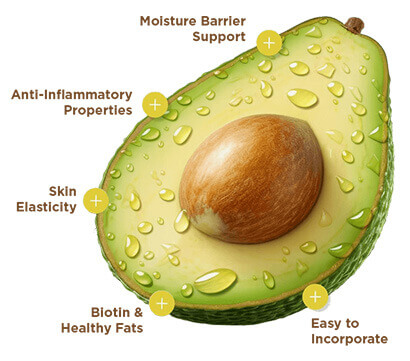
Moisture Barrier Support:
Avocados contain 5 mg of monounsaturated fats per serving and 72% of an avocado’s weight is water. Staying hydrated can contribute to healthier, more resilient skin.
Anti-Inflammatory Properties:
Avocados provide 4% DV of vitamin C, 6% DV of vitamin E, and 136 micrograms of lutein per 50g serving, which are antioxidants that may help protect cells from damage caused by free radicals. This damage can affect inflammation in some cases. It’s recommended to get antioxidants through healthy foods, like avocados, and not supplements.
Skin Elasticity
Avocados contain 136 micrograms of lutein and zeaxanthin per serving, which are carotenoids that may contribute to skin elasticity.
Biotin & Healthy Fats for Hair & Scalp
Avocados contain 4% DV of biotin and 6 g of healthy fats per serving, which can contribute to overall skin and scalp health. Biotin is naturally present in most healthy diets.
Easy to Incorporate
Avocados can be incorporated into your diet or used in DIY face masks as part of a self-care skincare routine.
In this article, we’ll explore the many nutritional benefits of avocados and how they can help support healthy skin. Whether you add avocados to your favorite breakfast burrito or throw together a fresh face mask with an overripe one, avocados will sure become your skin’s MVP.
Are Avocados Good For Your Skin?
Great skin starts from the inside. The food you eat plays a key role in how radiant, hydrated, and resilient your skin looks on the outside. Certain nutrients are considered the superstars of skin health:
- Vitamin A supports normal skin cell turnover.
- Vitamin C functions as an antioxidant, helps your body make collagen, which is essential for skin elasticity and repair.
- Vitamin E functions as an antioxidant, helping protect skin cells from oxidative stress.
- Niacin (vitamin B3) helps to maintain the skin’s moisture barrier, reducing the risk of dryness.
- Zinc plays a part in wound healing and immune function, both essential for skin integrity.
Avocados provide 4% of the Daily Value (DV) for vitamin C, 6% of the DV for vitamin E, and 6% of the DV for niacin per 50 g serving, making them a nutrient-dense addition to a skin-friendly diet. And while avocados don’t contain vitamin A, their healthy fats can help your body absorb fat-soluble vitamins like A, D, E, and K when eaten together.
Many skin concerns can be related to inflammation, as the body’s immune response can affect the skin’s structure and function. Chronic inflammation can contribute to dryness, loss of elasticity, redness, and irritation by disrupting the skin barrier and breaking down collagen and elastin. Conditions like eczema, psoriasis, and rosacea are inflammatory skin disorders that can lead to dryness, flaking, and sensitivity. Additionally, oxidative stress, a form of inflammation caused by environmental factors like UV exposure and pollution, can accelerate skin aging and contribute to fine lines and wrinkles. Inflammation is not the only factor that affects the appearance of skin; lifestyle choices and genetics are also determinants of your skin health. Making healthy choices and following a nutrient-rich diet can lead to reduced inflammation.
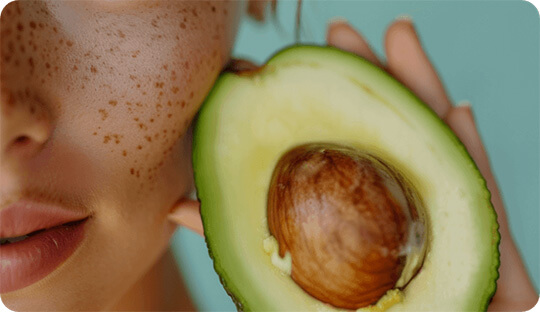
Avocados have skin-loving nutrients that make them a great addition to a clear-skin diet. Their combination of healthy fats, antioxidants, and vitamins helps maintain skin hydration, supports the skin’s natural barrier, and provides antioxidants that help protect against oxidative stress. Including avocados as part of a nutrient-dense diet may contribute to smooth, supple skin.
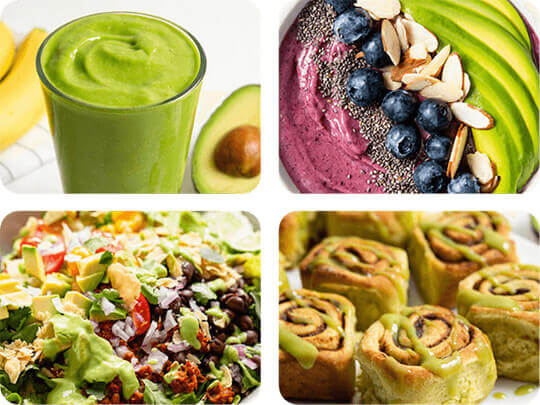
Avocados for Hydrated, Nourished Skin
You can lather on the fanciest moisturizer, but staying hydrated is always the best way to achieve healthy, dewy skin.
Avocados are 72% water, which may support skin hydration.
But it’s not just the water content that makes avocados skin-friendly. They provide healthy monounsaturated fats, which help strengthen your skin’s natural barrier, locking in moisture and keeping dryness at bay. Plus, avocados contain 6% DV of vitamin E, a powerful antioxidant that may help protect skin from damage, and 4% DV of vitamin C, which supports collagen production, per serving.

Adding avocados to your meals is easy and delicious. Toss them into smoothies, superfruit bowls, salads, or even cinnamon rolls for a simple, skin-loving meal. Taking in plenty of fluids helps your body stay hydrated more efficiently, giving your skin a healthy, radiant look from within.
Can Avocados Keep Skin Youthful?
Our skin naturally loses elasticity as we age, leading to fine lines and wrinkles. While no food can stop aging, certain nutrients can support skin health and help maintain a youthful appearance.
In a clinical trial among 39 healthy, overweight women, researchers found that daily intake of one avocado for eight weeks improved firmness and elasticity of forehead skin. The Avocado Nutrition Center supported the study. Although these findings are limited and more research is needed to confirm the results, the study suggests a potential role for eating avocados in skin health.
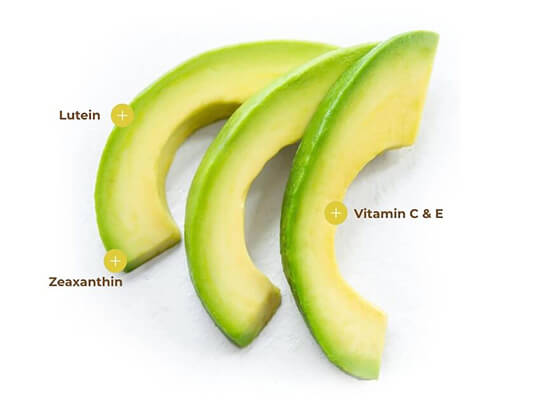

A serving of avocado also contains 136 micrograms of lutein and zeaxanthin — carotenoids known for their antioxidant properties. Antioxidants — such as vitamins C, E, and lutein — help protect cells from damage caused by free radicals.

From Head To Toes: How Avocados Help Your Hair
Avocados aren’t just great for your skin — they can also nourish your hair from the inside out. Adding avocados to your diet can be a simple, natural way to promote healthier, shinier hair due to the healthy fats and nutrients they contain.
A well-hydrated scalp is the foundation for healthy hair, and a serving of avocado provides 5 g of monounsaturated and 1 g of polyunsaturated fats that help keep it moisturized. Drinking too little fluid can lead to dry skin and scalp, but some foods can help. 72% of an avocado’s weight is water. Maintaining healthy skin also benefits the skin on your scalp, which can affect the appearance of your hair.
Biotin, or vitamin B7, is essential for hair growth and strength. Avocados also contain 4% DV of biotin, which is associated with shinier, more resilient hair. The research on the effects of biotin on hair is still emerging, but it is certainly essential to a healthy diet. While severe biotin deficiencies can lead to hair thinning, getting enough from food sources like avocados may support overall hair health. It is important to note that biotin deficiencies are rare, and eating a healthy and balanced diet is likely to provide you with all the biotin you need.
Can Avocados Help With Dark Circles and Puffy Eyes?
Dark circles and puffy eyes can result from lack of sleep, dehydration, and inflammation. While avocados won’t make them disappear overnight, their anti-inflammatory properties — thanks to their 6 g of healthy fats, 6% DV vitamin E, and 136 micrograms of lutein and zeaxanthin per serving — may help reduce swelling and support overall skin health.
Though there’s no direct evidence linking avocados to under-eye improvements, their nutrient profile supports skin nourishment and moisture retention. Some people even use mashed avocado or avocado oil as a topical treatment for a soothing effect. While results may vary, including avocados in your diet can be a tasty way to support healthy, hydrated skin.
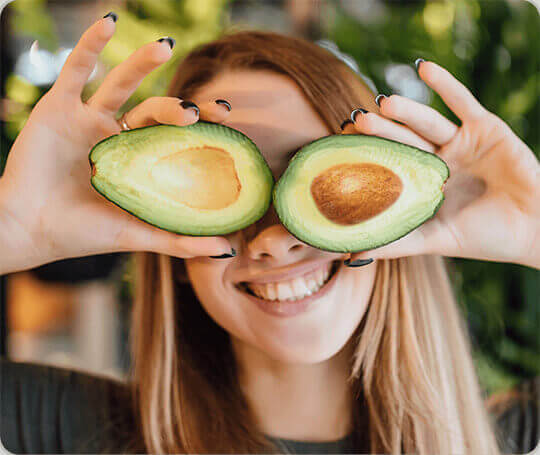
Adding Avocados To Your Clear Skin Diet
When adding avocados to your diet, think beyond guacamole. Whether you prefer savory or sweet dishes, avocados are the perfect addition to any meal to boost your wellness. Aim for several servings every day to maintain consistent nutrient intake.
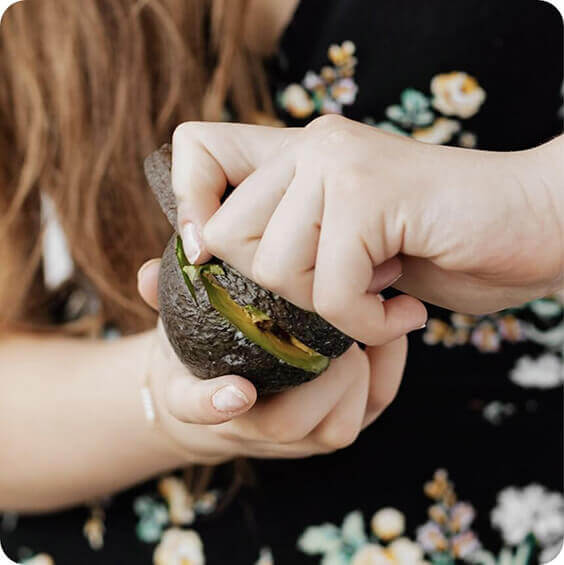
First get comfortable cutting and peeling your avocados. Pitting, slicing, and dicing an avocado is quite easy. Just wash and dry the avocado, place it on a secure surface, cut it lengthwise, and twist the halves apart to separate them. Then, safely remove the pit and slice, dice, or mash it as needed.
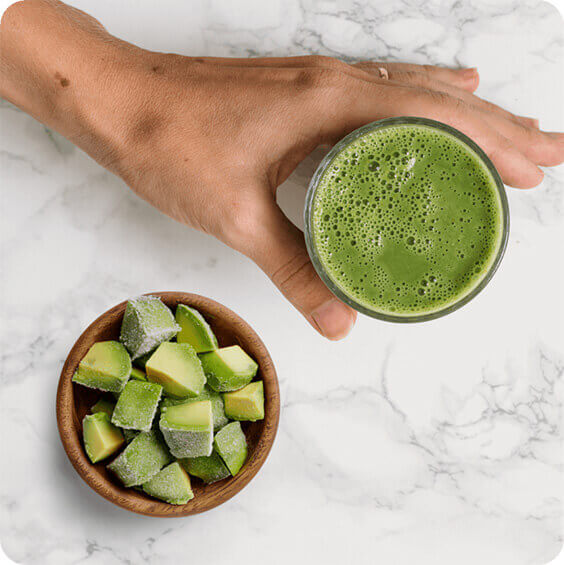
Busy lifestyle? Consider meal-prepping your avocados to save time. Frozen diced avocado chunks are excellent for smoothies and other blended avocado recipes. You can also store mash avocados in airtight containers in the fridge, sprinkled with lemon or lime juice to prevent browning. When eating sliced or diced fresh avocado it’s better to wait until serving time to cut and prep your avocado.
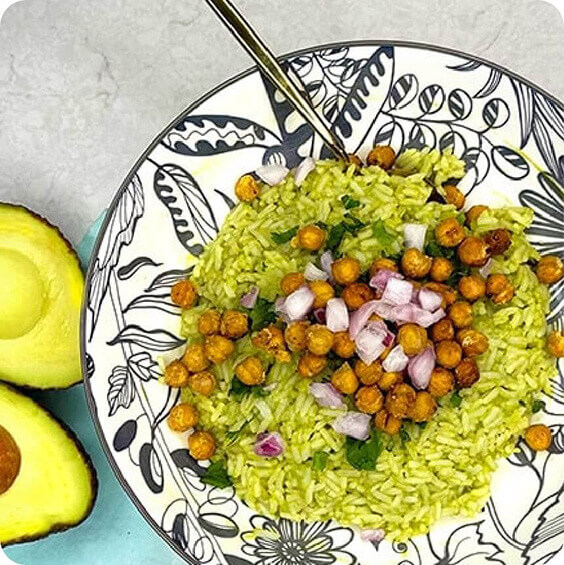
You can find avocado recipes for almost every meal — including dessert! They’re a great substitution for saturated fats in baking recipes, like blueberry muffins. Add them to breakfast tacos, or go for the classic avocado toast. For a larger meal, you can use avocados as the base for a delicious crema or as a creamy addition to your cilantro-lime rice. Mix up some dairy-free ice cream or dark chocolate vegan cupcakes to satisfy your sweet tooth. Upping your avocado intake is easier than ever with our recipes.
DIY Avocado Masks for Skin Health
Fruits and vegetables such as avocados help nourish and hydrate the skin when eaten, but there haven’t been any scientific studies that state whether avocados can improve dry skin when applied topically. That said, there is no harm in making avocado masks for dry skin as long as you test it for skin allergies first. If anything, avocado masks can be a relaxing act of self-care —and a way to save an overripe avocado.
Here’s our favorite avocado face mask recipe.

Easy Avocado Face Mask Recipe For Skin Health
This nourishing mask is perfect for a self-care night. Household ingredients come together to hydrate and soothe your skin. Here’s what to do.
Ingredients:
- ½ overripe avocado
- 2 tbsp honey
- 1-3 tbsp rolled oats
Instructions:
- Scoop the avocado flesh into a clean bowl.
- Mash the avocado with a fork or whisk until it reaches a smooth, creamy consistency.
- Stir in the honey until fully combined.
- Grind oats in a food processor or blender.
- Mix oats into the honey-avocado blend.
- Apply the mixture to your face, avoiding the eye area. Leave the mask on for 15-20 minutes to allow the nutrients to soak in.
- Rinse with warm water.
Keeping Your Skin Clear: Avoid These Skincare Mistakes
When using any mask for the first time, testing for potential allergies or sensitivities is essential. Before using it, apply a small amount to a discrete area of your skin, such as the inside of your wrist or behind your ear, and wait 24 to 48 hours to see if any irritation or allergic reaction occurs. Avoid products with harsh chemicals or fragrances, especially if you have sensitive skin. Choose products specifically designed for dry or sensitive skin to ensure they provide the hydration and soothing effects you need.
If you have persistent skin concerns or conditions like eczema or psoriasis, consult a dermatologist before trying new products. They’ll be able to evaluate your medical history and provide more personalized recommendations. Combine topical treatments with a nutrient-dense diet —including avocados, for the best results. This way, you reap the benefits inside and out.
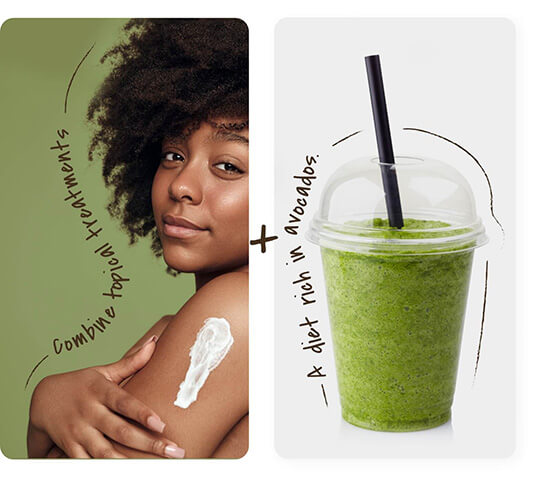
For more information on how avocados can benefit your overall health and skin, look at some of our other content on Love One Today. Here, you can find additional avocado-inspired skincare tips, recipes, and product recommendations to help you make the most of this versatile fruit. Embrace the natural power of avocados and enjoy their many benefits for your skin and well-being.




